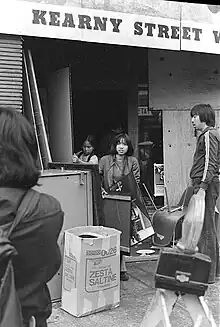
Kearny Street Workshop (KSW) in San Francisco, California, is the oldest multidisciplinary arts nonprofit addressing Asian Pacific American issues. The organization's mission is to produce and present art that enriches and empowers Asian Pacific American communities. Notable participants include author and Asian American studies scholar Russell Leong, playwright and author Jessica Hagedorn, author Janice Mirikitani, poet and historian Al Robles, and actor and filmmaker Lane Nishikawa.
History
Origins
Kearny Street Workshop was founded as an artists' collective in 1972 in the International Hotel (I-Hotel) on San Francisco's Kearny Street. The founders Jim Dong, Lora Joh Foo, and Mike Chin and other early leaders were involved in the Asian American movement, a Civil Rights Movement-inspired period of organizational and community building in the 1970s. The National Endowment for the Arts provided some initial funding through the Neighborhood Arts Program (NAP), an initiative of the San Francisco Arts Commission. Though the founders were initially distrustful of government funds, NAP liaison Bernice Bing and founder Jim Dong eventually agreed to use a $2,000 NAP grant to fund a graphics workshop for KSW participants.[1]
In its early days, KSW shared space with a dry goods store on the ground floor of the I-Hotel.[1][2] The organization originally focused on cultivating Chinese American arts and activism.[1] However, the organization quickly expanded to cater to a multiethnic constituency, holding classes for Asian American activists and artists to practice photography, creative writing, and silkscreen printing.[3] Within the first few years, hundreds of Bay-area students were attending classes, salons, workshops, and exhibitions each day.[4] KSW also opened Jackson Street Gallery in an adjacent I-Hotel storefront space in 1974, where Workshop members held exhibitions, poetry readings, and musical performances.[2]
Community activism
KSW played a key role in developing Asian American activist iconography during the I-Hotel anti-eviction movement. Students and other KSW members painted a block-long mural on the Jackson Street side of the I-Hotel in support of its tenants. Screenprinted posters advocating for the I-Hotel tenants' rights appeared throughout San Francisco's Chinatown, Manilatown, and Japantown during the decade-long fight for the I-Hotel. Artists from KSW also aided in the anti-eviction protests by organizing rallies, attending court hearings, hosting exhibitions on affordable housing, and publishing poetry and pamphlets that depicted life in the I-Hotel.[2]
KSW also provided summer youth programming that was intended to provide a diversion from gang violence in Chinatown. Workshop members also spearheaded the development of the annual Hop Jok Fair, which not only promoted Asian American artwork, but introduced many low-income Chinatown residents to available social and health services.[1]
Eviction and relocation
In 1977, both residential and business tenants were evicted from the I-Hotel. The workshop's headquarters relocated to a small storefront in North Beach, San Francisco. However, this relocation separated the organization from its key communities and constituents in Chinatown and Manilatown.[4]
KSW was able to return to Chinatown by 1981, leasing a basement space in a hotel on Clay Street. During its time in this space, members organized the Asian American Jazz Festival as well as the Kearny Street Workshop Press.[4]
In 1995, KSW was incorporated as a 501(c)(3) nonprofit organization and relocated to South Park, San Francisco.[4]
KSW finally relocated to a gallery and performance space in San Francisco's SoMa in 2010.
Programs and exhibitions
KSW's past and present programs include a small poetry press, writers' workshops, visual arts, martial arts, readings, music, gallery exhibitions, performances, and film screenings, as well as the Asian American Jazz Festival and the annual artists festival APAture.
Kearny Street Workshop Press
KSW's press published poetry by Bay-area Asian American authors such as Virginia Cerenio, Bob Hsiang, Jaime Jacinto, Genny Lim, Lenny Limjoco, and Jeff Tagami.[5]
Asian American Jazz Festival
KSW founded the Asian American Jazz Festival (AAJF) in 1981, with the help of organizers and KSW members George Leong and Paul Yamazaki.[6] Until it ceased production in 2006, the AAJF was the longest continuously-running jazz festival in the San Francisco area. Notable participants include Mark Izu, Fred Ho, Vijay Iyer, and Jin Hi Kim.
APAture
APAture is an annual multidisciplinary arts festival founded in 1999. Its mission is to promote emerging Bay-Area-based artists of Asian and/or Pacific Islander descent.[7] Notable participants include Gene Luen Yang, Ali Wong, Hasan Minhaj, Jane Kim, and Goh Nakamura.[8]
References
- 1 2 3 4 Arts., Council on Museums and Education in the Visual (1978). The art museum as educator : a collection of studies as guides to practice and policy. Newsom, Barbara Y., Silver, Adele Z. Berkeley: University of California Press. p. 207. ISBN 9780520032484. OCLC 3935054.
- 1 2 3 Art, Maryland Institute College of. "Visions and Voices of the I-Hotel: Urban Struggles, Community Mythologies and Creativity | MICA". www.mica.edu. Archived from the original on 2018-02-15. Retrieved 2017-09-19.
- ↑ Maeda, Daryl Joji (2016-06-09). "The Asian American Movement". Oxford Research Encyclopedia of American History. doi:10.1093/acrefore/9780199329175.013.21. ISBN 9780199329175.
- 1 2 3 4 Hsuan, Bryan (September 11, 1997). "Kearny Street Collective: Pioneering Workshop Turns 25". Asianweek.
- ↑ OpenLibrary.org. "Publisher: Kearny Street Workshop Press | Open Library". openlibrary.org. Retrieved 2017-09-19.
- ↑ "Asian American Jazz Festival". Brenda Wong Aoki & Mark Izu – Official Website. Retrieved 2017-09-19.
- ↑ "APAture FAQ". Kearny Street Workshop. Retrieved 2017-09-19.
- ↑ "Kearny Street Workshop Presents Over 60 Emerging Asian Pacific American Artists in the 16th Annual APAture Festival". Retrieved 2017-09-19.